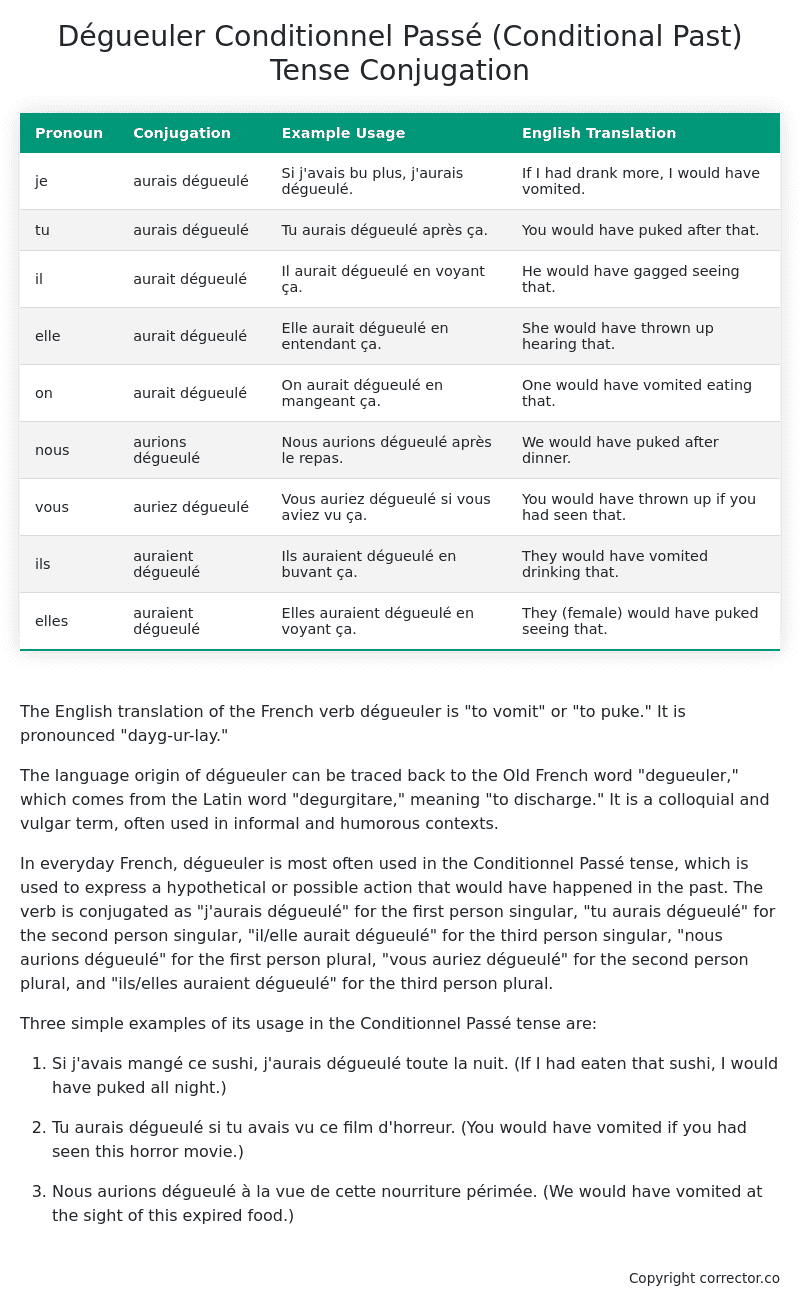Conditionnel Passé (Conditional Past) Tense Conjugation of the French Verb dégueuler
Introduction to the verb dégueuler
The English translation of the French verb dégueuler is “to vomit” or “to puke.” It is pronounced “dayg-ur-lay.”
The language origin of dégueuler can be traced back to the Old French word “degueuler,” which comes from the Latin word “degurgitare,” meaning “to discharge.” It is a colloquial and vulgar term, often used in informal and humorous contexts.
In everyday French, dégueuler is most often used in the Conditionnel Passé tense, which is used to express a hypothetical or possible action that would have happened in the past. The verb is conjugated as “j’aurais dégueulé” for the first person singular, “tu aurais dégueulé” for the second person singular, “il/elle aurait dégueulé” for the third person singular, “nous aurions dégueulé” for the first person plural, “vous auriez dégueulé” for the second person plural, and “ils/elles auraient dégueulé” for the third person plural.
Three simple examples of its usage in the Conditionnel Passé tense are:
-
Si j’avais mangé ce sushi, j’aurais dégueulé toute la nuit. (If I had eaten that sushi, I would have puked all night.)
-
Tu aurais dégueulé si tu avais vu ce film d’horreur. (You would have vomited if you had seen this horror movie.)
-
Nous aurions dégueulé à la vue de cette nourriture périmée. (We would have vomited at the sight of this expired food.)
Table of the Conditionnel Passé (Conditional Past) Tense Conjugation of dégueuler
| Pronoun | Conjugation | Example Usage | English Translation |
|---|---|---|---|
| je | aurais dégueulé | Si j’avais bu plus, j’aurais dégueulé. | If I had drank more, I would have vomited. |
| tu | aurais dégueulé | Tu aurais dégueulé après ça. | You would have puked after that. |
| il | aurait dégueulé | Il aurait dégueulé en voyant ça. | He would have gagged seeing that. |
| elle | aurait dégueulé | Elle aurait dégueulé en entendant ça. | She would have thrown up hearing that. |
| on | aurait dégueulé | On aurait dégueulé en mangeant ça. | One would have vomited eating that. |
| nous | aurions dégueulé | Nous aurions dégueulé après le repas. | We would have puked after dinner. |
| vous | auriez dégueulé | Vous auriez dégueulé si vous aviez vu ça. | You would have thrown up if you had seen that. |
| ils | auraient dégueulé | Ils auraient dégueulé en buvant ça. | They would have vomited drinking that. |
| elles | auraient dégueulé | Elles auraient dégueulé en voyant ça. | They (female) would have puked seeing that. |
Other Conjugations for Dégueuler.
Le Present (Present Tense) Conjugation of the French Verb dégueuler
Imparfait (Imperfect) Tense Conjugation of the French Verb dégueuler
Passé Simple (Simple Past) Tense Conjugation of the French Verb dégueuler
Passé Composé (Present Perfect) Tense Conjugation of the French Verb dégueuler
Futur Simple (Simple Future) Tense Conjugation of the French Verb dégueuler
Futur Proche (Near Future) Tense Conjugation of the French Verb dégueuler
Plus-que-parfait (Pluperfect) Tense Conjugation of the French Verb dégueuler
Passé Antérieur (Past Anterior) Tense Conjugation of the French Verb dégueuler
Futur Antérieur (Future Anterior) Tense Conjugation of the French Verb dégueuler
Subjonctif Présent (Subjunctive Present) Tense Conjugation of the French Verb dégueuler
Subjonctif Passé (Subjunctive Past) Tense Conjugation of the French Verb dégueuler
Subjonctif Imparfait (Subjunctive Imperfect) Tense Conjugation of the French Verb dégueuler
Subjonctif Plus-que-parfait (Subjunctive Pluperfect) Tense Conjugation of the French Verb dégueuler
Conditionnel Présent (Conditional Present) Tense Conjugation of the French Verb dégueuler
Conditionnel Passé (Conditional Past) Tense Conjugation of the French Verb dégueuler (this article)
L’impératif Présent (Imperative Present) Tense Conjugation of the French Verb dégueuler
L’infinitif Présent (Infinitive Present) Tense Conjugation of the French Verb dégueuler
Struggling with French verbs or the language in general? Why not use our free French Grammar Checker – no registration required!
Get a FREE Download Study Sheet of this Conjugation 🔥
Simply right click the image below, click “save image” and get your free reference for the dégueuler Conditionnel Passé tense conjugation!

Dégueuler – About the French Conditionnel Passé (Conditional Past) Tense
Formation
Common Everyday Usage Patterns
Expressing Unreal Past Scenarios
Polite Requests or Suggestions
Expressing Doubt or Uncertainty
Interactions with Other Tenses
Conditional Present
Indicative Past Tenses
Conditional Future
Summary
Want More?
I hope you enjoyed this article on the verb dégueuler. Still in a learning mood? Check out another TOTALLY random French verb conjugation!


